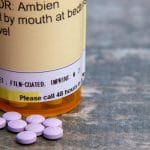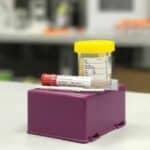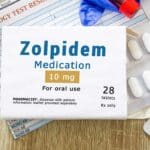Zolpidem or zolpidem tartrate (brand name Ambien and Ambien CR) is a sedative-hypnotic prescription drug, not a benzodiazepine.
However, Ambien and benzodiazepines, or “benzos,” are both Schedule IV controlled substances that can be habit-forming, according to the United States Drug Enforcement Administration (DEA).
These prescription drugs act similarly, affecting the neurotransmitter gamma-aminobutyric acid (GABA) receptors in the central nervous system (CNS) and producing calming effects.
However, Ambien is considered a non-benzodiazepine. It is a sleep aid available as an extended-release option with the brand name Ambien CR.
Examples Of Benzodiazepines
Benzodiazepines are used for a number of reasons including to treat those suffering from panic attacks caused by certain anxiety disorders. Benzodiazepines can also be used to help treat insomnia and certain seizure disorders.
Examples of benzodiazepines include:
Side Effects Of Ambien
Although the side effects of benzodiazepines and Ambien may be similar, Ambien ultimately has a wide-range of side effects that are different from the more sedative and euphoric feelings caused by benzodiazepines.
Common Side Effects
According to the United States Food and Drug Administration (FDA), the short-term use of Ambien may cause a number of side effects such as:
- diarrhea
- dizziness
- nausea
- short-term memory loss
- drowsiness
- headache
- constipation
- dry mouth
- changes in appetite
Serious Side Effects
Although the Ambien half-life is short, those who abuse the drug or take Ambien long-term may experience a number of serious side effects such as sleep-driving or sleepwalking.
Sleep-driving can lead to motive vehicle crashes while those sleepwalking can experience accidental falls or drownings.
In addition to this, those who abuse Ambien may find themselves making phone calls, cooking, or even eating food at night without remembering doing so the next morning.
This prescription medication, when abused, may also lead to a number of serious and life-threatening side effects including withdrawal symptoms.
Risks Of Ambien Abuse
There are a number of risks to be aware of when taking Ambien long-term or when abusing the drug in higher doses.
Ambien Withdrawal Symptoms
Those who abuse Ambien may experience a number of withdrawal symptoms if they abruptly stop taking the medication.
The FDA states that some of the withdrawal symptoms a person may experience consist of:
- cravings for the drug
- muscle cramps
- convulsions
- tremors
- vomiting
- dysphoria or unease
Drug Interactions
Those who take Ambien should not combine the sedative-hypnotic with other drugs, as serious interactions may take place.
For instance, those who take Ambien should avoid:
- other sleeping pills such as Lunesta
- prescription or illicit opioids
- stimulants such as dextroamphetamine and amphetamine (Adderall)
- barbiturates
- triazolam (Halcion)
- alcohol
- certain antifungal medications
- other Schedule IV drugs such as tramadol (Ultram)
Combining any CNS depressant with Ambien can result in a number of life-threatening health concerns.
Ambien Overdose
If a person takes Ambien in large doses, they may experience a potential overdose.
Some of the symptoms of an Ambien overdose may include:
- severe drowsiness
- loss of consciousness
- slowed breathing
- fluctuations in body temperature
- seizures
All of these symptoms can worsen if other drugs have been combined with Ambien.
Substance Abuse Treatment
If you or a loved one are struggling with drug abuse, consider finding a recovery center where you can receive detox support for withdrawal and addiction treatment for underlying mental health concerns.
At Northeast Addictions Treatment Center, we provide treatment services on an outpatient basis. Our services include day treatment, intensive outpatient treatment, individual and group therapy, and aftercare.
To learn more, please contact us today to speak with one of our healthcare professionals.
Sources
Written by
Northeast Addition Editorial Team
©2024 Northeast Addition Center | All Rights Reserved
This page does not provide medical advice.





